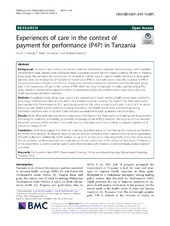| dc.contributor.author | Chimhutu, Victor | |
| dc.contributor.author | Tjomsland, Marit | |
| dc.contributor.author | Mrisho, Mwifadhi | |
| dc.date.accessioned | 2020-01-09T14:01:57Z | |
| dc.date.available | 2020-01-09T14:01:57Z | |
| dc.date.issued | 2019-10-16 | |
| dc.Published | Chimhutu V, Tjomsland M, Mrisho M. Experiences of care in the context of payment for performance (P4P) in Tanzania. Globalization and Health. 2019;15:59 | eng |
| dc.identifier.issn | 1744-8603 | |
| dc.identifier.uri | https://hdl.handle.net/1956/21270 | |
| dc.description.abstract | Background Tanzania is one of many low income countries committed to universal health coverage and Sustainable Development Goals. Despite these bold goals, there is growing concern that the country could be off-track in meeting these goals. This prompted the Government of Tanzania to look for ways to improve health outcomes in these goals and this led to the introduction of Payment for Performance (P4P) in the health sector. Since the inception of P4P in Tanzania a number of impact, cost-effective and process evaluations have been published with less attention being paid to the experiences of care in this context of P4P, which we argue is important for policy agenda setting. This study therefore explores these experiences from the perspectives of health workers, service users and community health governing committee members. Methods A qualitative study design was used to elicit experiences of health workers, health service users and health governing committee members in Rufiji district of the Pwani region in Tanzania. The Payment for Performance pilot was introduced in Pwani region in 2011 and data presented in this article is based on this pilot. A total of 31 in-depth interviews with health workers and 9 focus group discussions with health service users and health governing committee members were conducted. Collected data was analysed through qualitative content analysis. Results Study informants reported positive experiences with Payment for Performance and highlighted its potential in improving the availability, accessibility, acceptability and quality of care (AAAQ). However, the study found that persistent barriers for achieving AAAQ still exist in the health system of Tanzania and these contribute to negative experiences of care in the context of P4P. Conclusion Our findings suggest that there are a number of positive aspects of care that can be improved by Payment for Performance. However its targeted nature on specific services means that these improvements cannot be generalized at health facility level. Additionally, health workers can go as far as they can in improving health services but some factors that act as barriers as demonstrated in this study are out of their control even in the context of Payment for Performance. In this regard there is need to exercise caution when implementing such initiatives, despite seemingly positive targeted outcomes. | en_US |
| dc.language.iso | eng | eng |
| dc.publisher | BioMed Central | eng |
| dc.rights | Attribution CC BY | eng |
| dc.rights.uri | http://creativecommons.org/licenses/by/4.0 | eng |
| dc.subject | Pay for performance (P4P) | eng |
| dc.subject | Results-based financing | eng |
| dc.subject | Performance-based financing | eng |
| dc.subject | Output-based financing | eng |
| dc.subject | Tanzania | eng |
| dc.subject | Africa | eng |
| dc.title | Experiences of care in the context of payment for performance (P4P) in Tanzania | eng |
| dc.type | Peer reviewed | |
| dc.type | Journal article | |
| dc.date.updated | 2019-10-18T09:29:46Z | |
| dc.description.version | publishedVersion | |
| dc.rights.holder | Copyright The Author(s) 2019 | eng |
| dc.identifier.doi | https://doi.org/10.1186/s12992-019-0503-9 | |
| dc.identifier.cristin | 1738326 | |
| dc.source.journal | Globalization and Health | |

